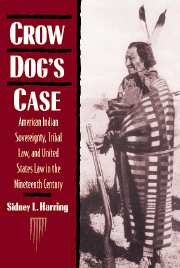 Crow Dog's Case
Crow Dog's Case Book contents
- Frontmatter
- Contents
- Acknowledgments
- 1 “This high pretension of savage sovereignty”
- 2 Corn Tassel: state and federal conflict over tribal sovereignty
- 3 U.S. Indian law and the Indian nations: the Creek Nation, 1870–1900
- 4 Crow Dog's case
- 5 Imposed law and forced assimilation: the legal impact of the Major Crimes Act and the Kagama decision
- 6 Sitting Bull and Clapox: the application of BIA law to Indians outside of the Major Crimes Act
- 7 The struggle for tribal sovereignty in Alaska, 1867–1900
- 8 The legal structuring of violence: U.S. law and the Indian wars
- 9 Conclusion
- Index
7 - The struggle for tribal sovereignty in Alaska, 1867–1900
Published online by Cambridge University Press: 23 September 2009
- Frontmatter
- Contents
- Acknowledgments
- 1 “This high pretension of savage sovereignty”
- 2 Corn Tassel: state and federal conflict over tribal sovereignty
- 3 U.S. Indian law and the Indian nations: the Creek Nation, 1870–1900
- 4 Crow Dog's case
- 5 Imposed law and forced assimilation: the legal impact of the Major Crimes Act and the Kagama decision
- 6 Sitting Bull and Clapox: the application of BIA law to Indians outside of the Major Crimes Act
- 7 The struggle for tribal sovereignty in Alaska, 1867–1900
- 8 The legal structuring of violence: U.S. law and the Indian wars
- 9 Conclusion
- Index
Summary
The legal history of Indian–white relations in Alaska is substantially unrelated to parallel developments in the rest of the United States. While twentieth century federal Indian law often applies to Alaska in the same manner as it does to the rest of the country, nineteenth-century law did not. In fact, the major nineteenth-century federal Indian law cases had little impact in Alaska; few cases arose, both because courts came to Alaska only in 1884 and because there were so few whites. Moreover, no treaties were made with Alaskan natives, and many provisions of the Indian Trade and Intercourse Acts did not govern trade between whites and Alaska's tribes. In the nineteenth century, Alaskan natives lived under the same law as Alaskan whites. They were denied special status, either as tribal sovereigns or as wards dependent on federal protection. This reflected a deliberate decision by local whites, deferred to by federal courts and officials, who either desired to avoid the problems of the Indian law that existed in the rest of the United States or were simply unconcerned about Alaska because of its remoteness.
In order to provide a better understanding of both the history of federal Indian law and Alaska's unique situation, this chapter focuses on the legal incorporation of the Tlingit into U.S. law. The Tlingit occupied one thousand miles of coastline along the panhandle of southeast Alaska and bore most of the early impact of U.S. colonialism.
- Type
- Chapter
- Information
- Crow Dog's CaseAmerican Indian Sovereignty, Tribal Law, and United States Law in the Nineteenth Century, pp. 207 - 250Publisher: Cambridge University PressPrint publication year: 1994


